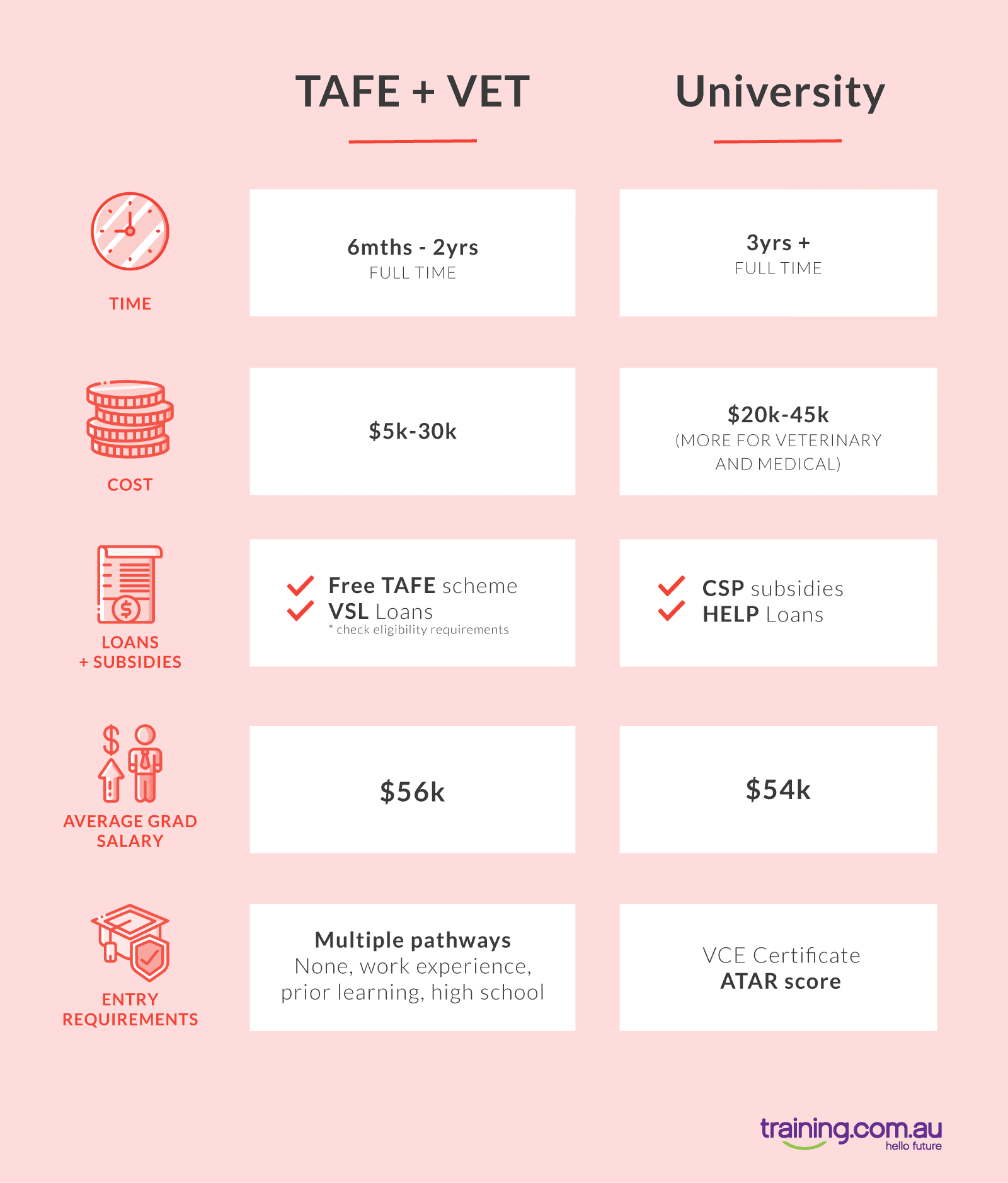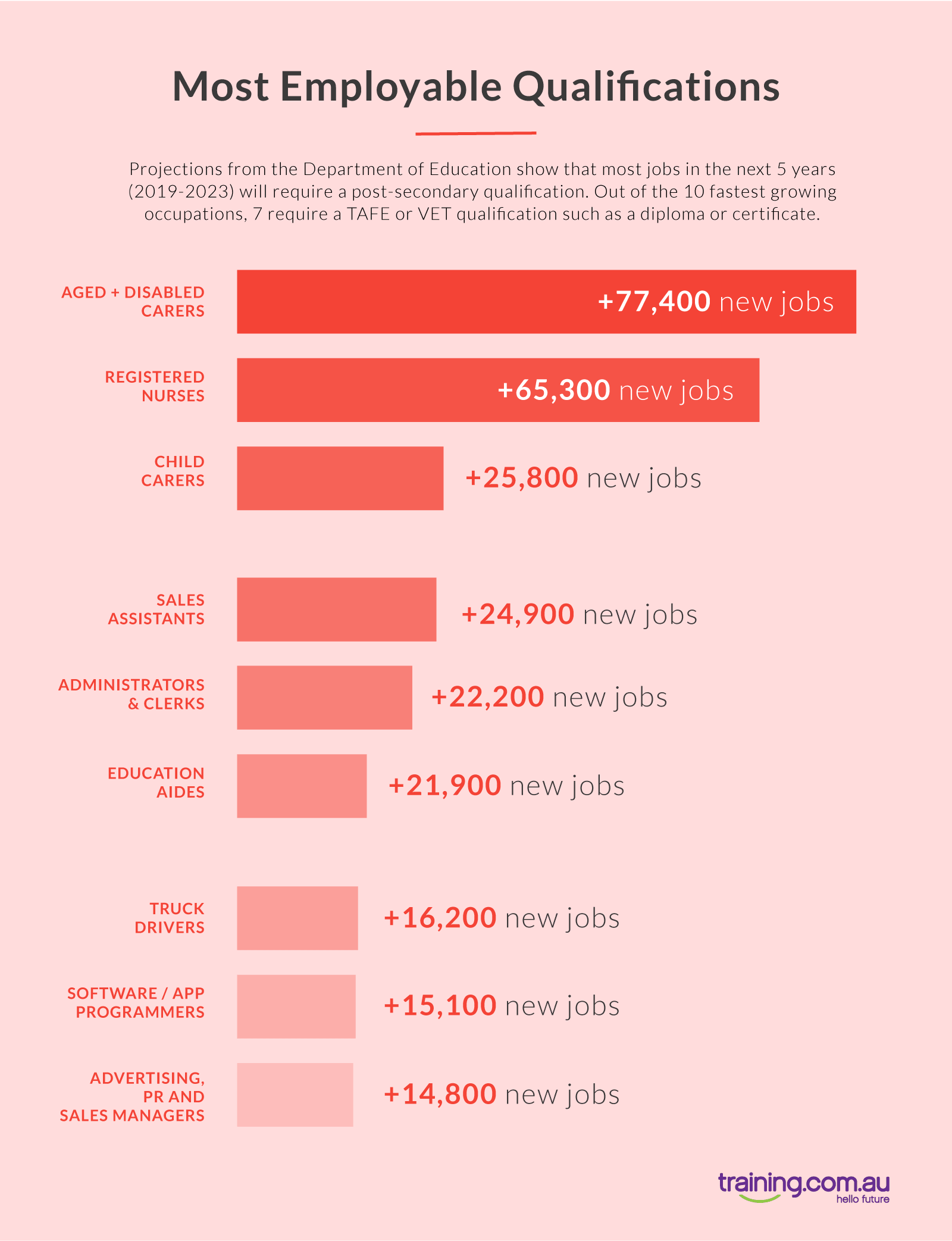In this post
TAFE vs Uni: ‘University Is For Learning, Vet Is For Earning’ Says Skills Minister

What’s better, uni or TAFE?
In short, VET Vocational Education and Training (which includes TAFE) is better than uni if your aim is to find a job and make good money.
‘University is for learning, VET is for earning‘ said Skills Minister Michaela Cash recently at a business breakfast, and it makes sense, according to the statistics. VET graduates earn higher salaries and have better job prospects while spending less time and money getting qualifications.
If your aim is to make money and achieve financial success, TAFE courses and VET courses are the way to go, and following the Joyce Report, government spokespeople have been highlighting TAFE as the better option for many people.
Senator Cash encouraged more people to take on VET qualifications like Diplomas, Certificates III and IV, and Advanced Diplomas, saying that it’s a better path to a good income – since the skills taught in VET and TAFE are in high demand in Australia.
VET makes economic sense for Australia, too. Australia’s national skills shortages in jobs like bricklayers, carpenters, plumbers and bakers, occupations demanding practical skills that are best learnt in vocational courses, or in care sectors like healthcare and community service.
By choosing a field in demand, you become a more valuable employee, enjoying higher salaries and benefits as companies compete to hire and keep you.
How is TAFE different to university?
TAFE and VET qualifications take from 6 months to 2 years, unlike university degrees which take 3 years minimum full-time. And while bachelor degrees can often cost over $30,000, TAFE and VET courses are usually much cheaper, especially as the fees for government-subsidised students are often heavily reduced.
Let’s not forget that courses in skill shortages are eligible for free TAFE – meaning that the student pays zero, zip, nada.
On average tafe grads earn
$2000
higher starting salary than a university graduate
and you don’t even need an ATAR to get in. In fact, often you don’t even need to have finished high school.

Of course, university education has its place, but it’s not for everybody. For those who are truly interested in learning and pursuing a field of knowledge for its own sake, becoming a university student and pursuing higher education can be a gateway to a wider world of education.
Further, employment prospects are not solely determined by whether you choose VET or university, rather they depend upon the subject you choose: in-demand industries like IT and health will always have better job prospects than low-demand ones with high competition.
The problem lies in expecting that the traditional path – from high school to university to a job – still applies, or that it’s the best way to a good career path.
But generally, if you’re looking to graduate with work-ready skills, VET qualifications are the better option.
Job-ready Skills
The expectation that going to uni guarantees you a good job (and a decent income) doesn’t reflect the 2019 work reality. University alone often isn’t enough to equip you with the skills to be job-ready when you graduate.
2/3
of University graduates surveyed in 2015 said their degree didn’t prepare them enough to find a job in their field.
Compare this to
78%
of VET graduates who find employment after graduating.
Once a few years have passed and you’ve got your first full-time job, employment and levels even out to be about the same for TAFE and uni grads. Right out of the gate, though, TAFE qualifications are paid more and have a better chance of finding jobs.
Most employable degrees and qualifications
Projections from the Department of Education show that most jobs in the next 5 years (2019-2023) will require a post-secondary qualification. Out of the 10 fastest growing occupations, 7 require a TAFE or VET qualification such as a diploma or certificate.
So perhaps we should be talking about ‘most employable diplomas’ rather than degrees. The Australian industries with the highest job growth in the next four years are:
- Medical and healthcare services: 116,000
- Food and beverage service: 91,000
- Construction services: 77000
- Professional, Scientific and Technical Services (Excl Computer System design): 72,000
- Social assistance services: 66,000
- Public administration: 64,000
- Preschool and school education: 57,000
- Computer system design and related services: 54,000
- Adult, community and other education: 40,000
- Building and construction: 39,000
The specific jobs set to boom are:
- General Clerks +22,200
- Truck Drivers +16,200
- Software And Applications Programmers +15,100
- Advertising, Public Relations And Sales Managers +14,800
- General Practitioners And Resident Medical Officers +14,500
- Aged And Disabled Carers +77,400
- Registered Nurses +65,300
- Child Carers +25,800
- General Sales Assistants +24,900
- Education Aides +21,900
Source: Australian Government Department of
Jobs and Small Business: National, State and Territory
Skill Shortage Information

How much does it cost to go to TAFE? Is TAFE cheaper than uni?
TAFE courses usually cost significantly less than university degrees. And with high HELP debts on the rise, students are considering whether university is worth it, when they’re graduating with considerable debt.
High HELP debts are on the rise. The average owing HELP (formerly HECs) debt in Australia is $21,557, but debts over $50,000 have increased 30% from 2018’s data, and there are now 9x more debts over $100k than there were 10 years ago.
If you’re a government-subsidised student, TAFE courses may cost you anywhere between a couple of hundred dollars a few thousand, though it varies by course.
After the 2018 introduction of Free TAFE in Victoria, you may not even have to pay for your course at all if you meet the criteria of age, location, citizenship and education history. Eligible courses in skill shortage areas are fully subsidised by the government – meaning you pay nothing and have no HELP debt when you graduate.
Eligible courses fall into the following areas:
- Nursing
- Accounting
- Agriculture
- Building & Construction
- Automotive
- Aged Care & Disability Care Support
- Hairdressing
- Signage & Graphics
- Food
- Services
So, what’s the best choice? It depends on what you want out of your study.
If you’re interested in learning for its own sake and working with knowledge in a more abstract sense; or you have a particular interest in a field that requires a degree, a bachelor degree could be the first step on a fulfilling journey and an engaging career.
Some people aren’t suited to the classroom, however, and do much better learning practical skills on the job. If that sounds like you, consider VET qualifications as your pathway to a great income and employability.
You can even use them as an entry pathway to a course later on if you want to dive deeper into the theory. You’ll come out with work-ready skills and good earning potential straight away, and your job prospects will be solid, especially if you choose an in-demand field.
Wondering if uni is really for you? VET and TAFE are fantastic options and better suited to many people.
Latest Articles
Agriculture Careers: What You Should Know in 2025
As one of Australia's most important industries, the agriculture industry offers great career opport...
Are Digital Skills the Key to Job Security in 2025?
The digital revolution is here, and it doesn’t care if you have a technical job or not — it’s coming...
How to Become a Chef in Australia: Complete Guide for 2025
The complete guide to becoming a chef in Australia. Learn how to get your start and make it in the h...
Want to read more?
Aussie Jobs in 2019: A Breakdown
The Australian Government’s recent report on changes in the Australian labour market identifies crit...
What Jobs Are In Demand In Australia? High Demand Jobs in Every Industry
Discover the most in-demand jobs in Australia for each industry, so you can pick a resilient and hig...
100,000 new apprentice jobs covered by $1.2 billion wage subsidies
The government's new scheme to get young and unemployed people back into the workforce will see 100,...
